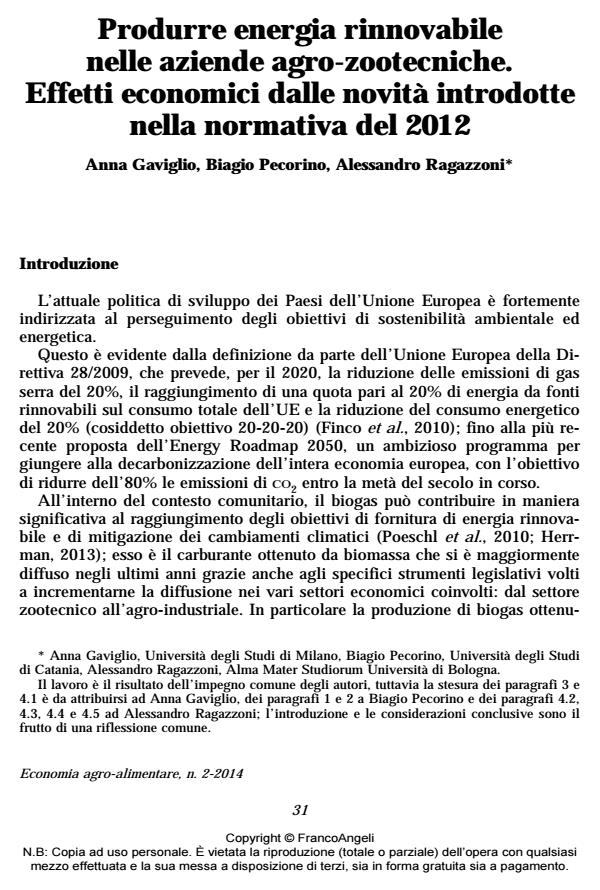Produrre energia rinnovabile nelle aziende agro-zootecniche. Effetti economici dalle novità introdotte nella normativa del 2012
Titolo Rivista ECONOMIA AGRO-ALIMENTARE
Autori/Curatori Anna Gaviglio, Biagio Pecorino, Alessandro Ragazzoni
Anno di pubblicazione 2014 Fascicolo 2014/2
Lingua Italiano Numero pagine 30 P. 31-60 Dimensione file 310 KB
DOI 10.3280/ECAG2014-002003
Il DOI è il codice a barre della proprietà intellettuale: per saperne di più
clicca qui
Qui sotto puoi vedere in anteprima la prima pagina di questo articolo.
Se questo articolo ti interessa, lo puoi acquistare (e scaricare in formato pdf) seguendo le facili indicazioni per acquistare il download credit. Acquista Download Credits per scaricare questo Articolo in formato PDF

FrancoAngeli è membro della Publishers International Linking Association, Inc (PILA), associazione indipendente e non profit per facilitare (attraverso i servizi tecnologici implementati da CrossRef.org) l’accesso degli studiosi ai contenuti digitali nelle pubblicazioni professionali e scientifiche.
This study proposes an analysis to evaluate the effects on the future choices of the zootechnical entrepreneur in light of the new indications in the Ministerial Decree of the July 6, 2012 "Execution of Art. 24 of the legislative decree 3 March 2011, no. 28 establishing incentives for the production of electricity from plants of renewable sources other than photovoltaic". Specifically, we will investigate the productive chain of biogas from anaerobic digestion and, in particular, the synergies that can be realized with the swine sector. The main objective is to assess what are the critical and the strength moments for the zootechnical entrepreneur in each stage of the chain, analyzing the opportunities of integration in order to gain an economic advantage in introducing innovative activities of process and transformation of livestock effluents; an economic profit can afford to enable virtuous practices on the part of the entrepreneur, also environmentally correct and able to make more sustainable the activities in the medium-long term.
Parole chiave:Energie rinnovabili, biogas, filiera integrate, comparto zootecnico, conto Economico
Jel codes:Q42, Q12, O13
- Coupling economic and GHG emission accounting models to evaluate the sustainability of biogas policies Andrea Bartoli, Lorie Hamelin, Stelios Rozakis, Magdalena Borzęcka, Miguel Brandão, in Renewable and Sustainable Energy Reviews /2019 pp.133
DOI: 10.1016/j.rser.2019.02.031 - Analysis of biomass availability for energy use in Sicily Gaetano Chinnici, Mario D’Amico, Marcella Rizzo, Biagio Pecorino, in Renewable and Sustainable Energy Reviews /2015 pp.1025
DOI: 10.1016/j.rser.2015.07.174 - From biogas to biomethane: A process simulation-based techno-economic comparison of different upgrading technologies in the Italian context Elena Barbera, Silvia Menegon, Donatella Banzato, Chiara D'Alpaos, Alberto Bertucco, in Renewable Energy /2019 pp.663
DOI: 10.1016/j.renene.2018.12.052 - The impact of different energy policy options on feedstock price and land demand for maize silage: The case of biogas in Lombardy A. Bartoli, D. Cavicchioli, D. Kremmydas, S. Rozakis, A. Olper, in Energy Policy /2016 pp.351
DOI: 10.1016/j.enpol.2016.06.018 - The Effect of Biogas Production on Farmland Rental Prices: Empirical Evidences from Northern Italy Eugenio Demartini, Anna Gaviglio, Marco Gelati, Daniele Cavicchioli, in Energies /2016 pp.965
DOI: 10.3390/en9110965
Anna Gaviglio, Biagio Pecorino, Alessandro Ragazzoni, Produrre energia rinnovabile nelle aziende agro-zootecniche. Effetti economici dalle novità introdotte nella normativa del 2012 in "ECONOMIA AGRO-ALIMENTARE" 2/2014, pp 31-60, DOI: 10.3280/ECAG2014-002003